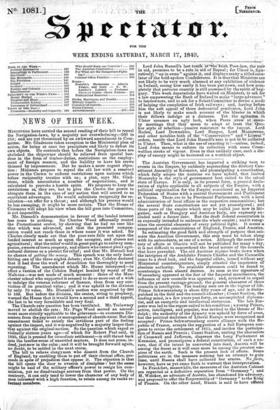NEWS OF THE WEEK.
MINISTERS have carried the second reading of their bill to repeal the Navigation-laws, by a majority not overwhelming-266 to 210; and are yet threatened by an awkward amendment in Com- mittee. Mr. Gladstone takes exception to the Ministerial plan of action, for being at once too precipitate and likely to defeat its own objects. He contends that before the Navigation-laws are abolished the shipowner should be relieved from special bur- dens in' the form of timber-duties, restrictions on the employ- ment of foreign seamen, and the liability to have his crews thinned by impressment. But he makes a more cogent objec- tion: Ministers propose to repeal the old law with a reserved power in the Crown to enforce restrictions upon nations which refuse reciprocity treaties with us ; a plan, says Mr. Glad- stone, which necessitates a number of negotiations, and is calculated to provoke a hostile spirit. He proposes to keep the restrictions ea, they are,- but to give the Crown the power to abrogate them in the case of any nation that will accord to us equivalent advantages. He would substitute reciproetty for re- taliation—an offer for a threat ; and although his process would be less sweeping, it might be more certain. That the House of Commons will adopt his view when the bin goes into Committee, is not impossible. Mr. Disraeli's demonstration in favour of the landed interest has come to nothing. Sir Charles Wood effectually routed the Protectionist orator, by showing that he had no case like that which was advanced, and that the promised compen- sation would not reach those in whose name it was asked. Sir Charles clearly made out that the poor-rate falls not upon the landed interest so much as upon the occupier, and classes not agricultural; that the relief would in great part go to railway com- panies, owners of town property, and others who cannot plead agri- cultural distress as a pretext for relief; and that Mr. Disraeli had no chance of getting the 9money. This speech was the only hard- hitting one of thethree-nights debate; even Mr. Cobden declared that it had done the work of demolition too thoroughly to need repeating. The amendment which Mr. Hume interposed—in effect a version of the Cobden Budget headed by repeal of the Malt-tax—was not made of much moment : those of the Man- chester school who supported it seemed to do so more out of a wish to indulge the veteran reformer of finance, than from any con- viction of its practical value ; and it was upheld in the division by only 70 votes. Mr. Disraeli's motion was negatived by 280 to 189. But before the division, the orator, rising to prophecy, warned the House that it would have a second and a third appeal, the last to be very formidable and very final. The Church-rate question has been ventilated. Mr. Trelawney moved to abolish the rate : Mr. Page Wood moved an amend- ment more strictly'applicable to the grievance—to exonerate Dis- senters from the payment or management of church-rates: But the amendment failed to satisfy the invidious part of the feeling against the impost, and it was negatived by a majority larger than that against the original motion. So the question which raged so violently sixteen years ago—of which Sir Robert Peel said, in 1885, that it pressed for immediate settlement—is still thrust back into the lumber-room of unsettled matters. It does not press, in- deed, justnow in the calm,. and it will be brought forward again, no doubt, to be settled in the next storm.
The bill to relieve clergymen who dissent from the Church of England, by enabling them to put off their clerical office, pro- ceeds in spite of prejudices that oppose it. The objection is that the bill opens the door to evasion of discipline-: but the same might be said of the military officer's power to resign his com- mission, yet no disadvantage accrues from that power. On the contrary, it can only tend to lower the character of any body of men intrusted-with a high function, to retain among its ranks re- lucteist members.


























